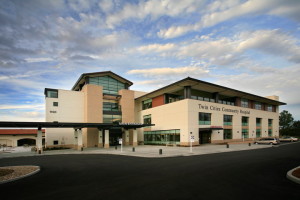Fifty-three nurses files claims against Twin Cities hospital
October 6, 2016

Twin Cities Community Hospital
A year and a half after nine nurses sued Twin Cities Community Hospital, 53 nurses filed claims against the Templeton medical center, alleging widespread violations of California labor laws are still ongoing. An attorney representing the nurses argues the hospital is “putting profits before people.”
In March 2015, the group of nine nurses filed suits alleging Twin Cities is routinely understaffed in order to increase profits, and nurses often cannot take breaks because they cannot find other workers to cover for each other. At times, hospital supervisors instructed nurses to take breaks and abandon their patients, violating state law on nurse-patient ratio, according to the lawsuits. Likewise, the plaintiffs allege Twin Cities required nurses to work off the clock in order to avoid paying them overtime.
Attorney Lauren Teukolksy, of San Luis Obispo law firm Baltodano and Baltodano, stated in a press release that Twin Cities did not remedy the problems identified in the lawsuits. That prompted a larger group of nurses to file claims on Monday, Teukolksy said.
“Our hope is that by bringing these claims on behalf of such a large number of nurses, the hospital will fix these problems once and for all, and start treating its nurses with the dignity and respect they deserve,” Teukolsky said.
Teukolsky noted that the owner of the Templeton hospital, Tenet, is one of the largest for-profit health care companies in the country. Tenet earned more than $2.276 billion in adjusted net income in 2015, and the company’s CEO, Trevor Fetter, received more than $13 million last year, the news release states.
A 2013 California Department of Health investigation found Twin Cities was understaffed, violating state-mandated nurse-patient ratios. Investigators concluded the under-staffing resulted in pain medication not being distributed in a timely manner, as well as an increase in patient falls.
In July 2014, the California labor commissioner awarded a Twin Cities nurse $32,000 for missed breaks as a result of under-staffing. The labor commissioner wrote the nurse could not take rests without fear of violating patient-nurse ratio requirements. The commissioner also concluded the hospital retaliated against nurses who exercised their right under state law to receive premium wages for missed breaks.
Wendy Lamb, a nurse who has worked at Twin Cities since 2010, issued a statement about the newly filed claims.
“It is unfortunate that we had to take legal action for the hospital to take our patient safety and staffing concerns seriously,” Lamb said. “We have been asking the hospital to remedy the situation for years, but management has ignored us. Proper staffing is essential to providing safe, quality care to our community and should never take a backseat to budgetary constraints. We deserve better. The community deserves better.”






The comments below represent the opinion of the writer and do not represent the views or policies of CalCoastNews.com. Please address the Policies, events and arguments, not the person. Constructive debate is good; mockery, taunting, and name calling is not. Comment Guidelines